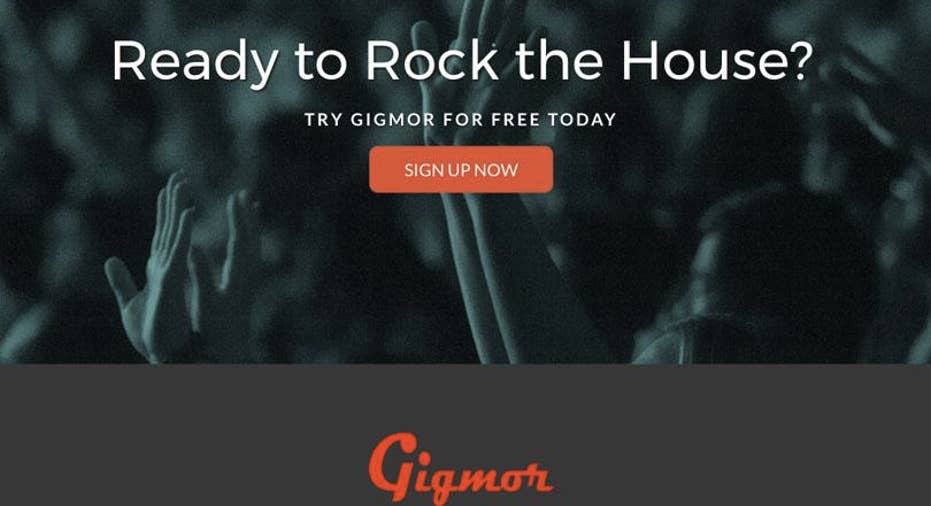Need a Gig, Musicians? This Site Can Hook You Up

While recorded music revenue has been shrinking over the last decade, the live music industry is booming, according to IBISWorld, to the tune of $28 billion. But 95 percent of artists don't have representation, and the process of forming a band has changed radically from the days when musicians posted ads in the back pages of Melody Maker, NME, or Rolling Stone.
Enter Gigmor, the modern digital equivalent of the "Band Seeks Drummer" want ad. It started in 2013 as a way to connect musicians, and just launched a global marketplace that adds gig-booking functionality.
David Baird, founder and CEO of Gigmor, has always been in bands—during his tenure as head of ecommerce at AOL and while running his own digital agency—from Toronto and NYC to London and Washington D.C. But when he moved to Los Angeles, he got frustrated trying to find musicians to jam and play gigs with. So he started Gigmor, which now has 50,000 users in 30 countries and has made over 1 million matches between musicians and bands. PCMag went to Gigmor's Santa Monica offices to find out more.
David, Gigmor has clearly captured the market for musicians finding each other. Talk us through the new site and its aims.Essentially we've been a "dating site for musicians." Since music is a collaborative art form, musicians have always needed to find each other to create. For the relaunch, initially, we wanted to use the same matching algorithm to help musicians find gigs and vice versa. However, we found the technology was not extensible, to use the 90s term, so we decided to build...out a marketplace.
Are you now effectively an agent? Doing the hustle on the phone to book piano players into late night supper clubs? I knew you were going to ask that (laughs). No, not really. I feel that technology can be a great enabler for markets that are so fragmented, like the music gig scene. There's the high end of the market, where the stadium acts and companies like Live Nation operate. But for most musicians, they live in a do-it-yourself world, as do the clubs, some of the festivals, and many talent buyers.
There are only about 15,000 artists in the USA who have representation, but there are millions of others, and that's who we're focusing on. In that sense, we are a virtual booking agent, but we're really a tech company that's focused on solving a big problem for the live music industry. If we can make it easier to find and book talent, we'll help musicians play more gigs so they can sustain a career and support themselves. And the world gets more live music!
If you're not taking a cut of the booking fee, what's your business model?We decided not to charge talent seekers who want to find musicians, because we didn't want to add barriers to posting qualified paid gigs. So the platform is free for all to use. But there will be an artists' subscriptions model when they want to apply for paid gigs listed on Gigmor.
A 'freemium' model? Essentially, yes. Using the site to post a profile or "seeking" ads to find musicians to jam with and form bands—that's all free. But for the paid gigs portion, there'll be a 30-day free beta and then, after that, two premium levels—for musicians—starting at a very affordable price point of $10 a month or, if you book more than a certain number of gigs a month through us, and are a working professional, it goes up to $20 a month.
In return, we provide tools so the musicians can promote themselves effectively, with feedback from gigs, videos of recent performances, pictures, SoundCloud audio integration, and so on. And we'll be providing a payment mechanism next so they can get paid for the gig they booked via us, on the platform itself.
You have a tab on the profile page that says 'Avails'—explain? The music industry uses the term "Avails" for musicians and bands who are available for gigs in specific locations like "New Orleans in November." For example, Natasha, who is a singer, might want to book a tour from San Diego to Seattle via L.A. and can put "Avails" posts for all those areas to get gigs or session work along the way.
How does it work from the venue—or talent seeker—side?Venues will post a paid gig, artists will apply, venues take a look at their profiles, see their gig history, listen to clips, see videos of performances and so on. They can then message the artist directly from within the Gigmor platform and handle the booking all in one place.
What's next for Gigmor?Data is a big part of the future of music. We're building out our data capabilities now, and we'll be launching "GigScore" in 2018. This will be a metric based on machine learning and data mining of our platform, which will assign a "value" to each artist, based on their career velocity, the "draw"—industry term for audience size at gigs, amount collected on the door/bar—if available—and so on.
The big tours for established artists are increasingly using predictive algorithms to work out potential audience size and profit per country/city/venue. But 95 percent of the music industry is unrepresented; we want Gigmor to bring that level of sophistication for everyone else to keep musicians working.
Final question. You founded Gigmor to find musicians to jam with; how did that work out for you?Ha! Well, I have found lots of musicians to play with my band but, since Gigmor is raising a seed round, my full focus is on the relaunch and meeting VCs. I can't wait until I can get back to playing; it's been a while.
This article originally appeared on PCMag.com.